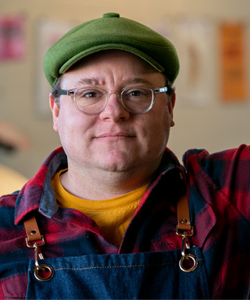Kadin Henningsen (English) is a 2022–2023 HRI Campus Graduate Student Fellow. Henningsen’s project, “Biblionormativity and Trans* Capacity: Gender, Race, and the Material Book in Nineteenth Century America, 1840–1910,” theorizes trans* capacity (the potential for making visible the mutability and multiplicity of gender) by mapping the development of aesthetic and material norms of the book (e.g., bookbinding, typography, editing, and extra-illustration).
Learn more about HRI’s Campus Fellowship Program, which supports a cohort of faculty and graduate students through a year of dedicated research and writing in a collaborative, interdisciplinary environment.
What is unique about your research on this topic?
My work brings together nineteenth-century American literary studies, book history, and transgender studies. Transgender studies, as it has developed alongside and in conversation with feminist and queer studies, has been invested in the interrogation of normative and non-normative gender, the materiality of the body, and the material conditions that impact trans life. More recently, trans studies has expanded its focus to the everyday objects that entangle with trans life. Book history, like trans studies, has an investment in materiality—attention to the materiality of books informs histories of book production and circulation. By paying attention to a book’s construction we can learn a lot about print networks that include paper manufacturers, printers, type-foundries, bookbinders, booksellers, and more. Book history as a field is only just starting to consider how a book’s materiality, from the book binding to the typography, informs socio-political ideologies.
“By bringing transgender studies to bear on the field of book history, my project interrogates how the material book participates in the formation of sex/gender and race in nineteenth-century America. What I think is unique about my project is that instead of focusing on texts and their content (the usual purview of literary studies), I focus instead on materiality and material practices including bookbinding, typography, editing, and extra-illustration to offer a trans history of the book in nineteenth-century America.” — Kadin Henningsen
What drives your interest in this research?
This project comes out of an almost 20-year interest (obsession?) in the relationship between books and bodies. I have always been interested in how books are like bodies and bodies are like books and how they are ultimately entwined with each other. I’m also interested in our attachments to books as objects, especially for queer and trans readers. While a project situated in the nineteenth century may not seem at first to have much to contribute to contemporary transgender politics, recent movements to ban books related to both LGBT topics and Critical Race Theory, coupled with the proliferation of anti-trans legislation across the U.S. has brought some urgency to my project. For instance, in my study of the development of gendered design elements in nineteenth century publishers’ bindings, I trace how these design elements inform contemporary design aesthetics that reify white non-trans heterosexual identity as a “natural” default, evident most recently in the cover for the anti-trans polemic Irreversible Damage: The Craze Seducing Our Daughters by Abigail Shrier, which features the image of a young white girl with the illusion of a hole in the dust jacket where her uterus should be. Shrier’s cover is a specter that haunts my project and contributes to its urgency.
How has the fellowship seminar impacted the way you approach your research?
While the HRI fellowship has provided much needed time for both research and writing, the bi-weekly seminars with fellows (both graduate and faculty) have been the most rewarding. The dissertation process can be a lonely and challenging endeavor. Conversations during seminars about each other’s work have been both generous and generative, while also bringing conviviality and joy to the work we do as scholars. I leave each seminar practically vibrating with excitement about my colleagues’ work. Through our conversations and engagement with each other’s work, I have been able to rethink some of my own approaches and have been introduced to a range of methods and theories, while also being reminded that research and writing can be fun and pleasurable despite its challenges. Indeed, for me, research and writing is the most pleasurable when done in the company of and in conversation with an interdisciplinary group of scholars.
Kadin will be sharing his research with the HRI community at our upcoming Undergraduate Coffee Hour on April 6!
